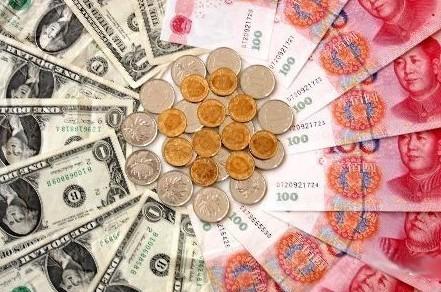


DALIAN, China, Sept. 12 -- China's surprise currency devaluation in mid-August was a natural result of exchange rate liberalization, which experts say will also promote the internationalization of the yuan.
Market turmoil following the unexpected move by the People's Bank of China (PBOC) was largely due to lack of information at the moment on central bank motives, rather than fundamental economic reasons, according to experts attending the annual meeting of the New Champions, also known as the Summer Davos, held in China's northeastern port city of Dalian.
"The devaluation was done at the correct time with correct reasons, but the result was quite a surprise," Li Daokui, who used to sit on the central bank's monetary policy committee, told the forum on Thursday.
Noting yuan's quasi-global status, Li said China's financial reforms must consider possible reactions abroad, even when the action is perfectly sensible.
The PBOC, which introduced a 1.86 percent depreciation against the U.S. dollar on Aug. 11, quickly reassured the market that it was letting the daily fixing rate move more closely along with the spot rate, a genuine effort of reform rather than the start of a sizable devaluation.
Analysts pointed out that the yuan has actually been overvalued, given strong appreciation in real effective terms in the past year.
From June 2014 to July 2015, the yuan has appreciated in real effective terms by 12 percent, mainly because of U.S. dollar appreciation, said Zhu Haibin, chief economist of J.P. Morgan China. Adding to the yuan's devaluation pressure, the currencies of many emerging markets and developed economies saw sharp weakening this past year.
"The devaluation was completely understandable and legitimate," said Lord J. Adair Turner, a senior fellow of the Institute for New Economic Thinking in Britain. "The difficulty is that people are trying to know what it means for the future."
Chinese Premier Li Keqiang has repeatedly told the market that there is no basis for continued devaluation. The same message was delivered in his address on Thursday to the Summer Davos forum, a key global occasion every year for the premier to talk on the Chinese economy.
Vowing to keep the exchange rate basically stable at a reasonable and balanced level, Li also expressed unwavering determination for reform, including liberalizing the exchange rate regime and capital account, and supporting the growth of offshore renminbi market.
The strength of the yuan in the long term, experts say, is unlikely to weaken given the economy is structurally well. But with the opening of China's capital account, there will be more frequent exchange rate fluctuations.
"The world will learn and probably get used to it," said Huang Yiping, who sits on the monetary policy board.
GLOBAL YUAN
The PBOC's market-based reform quickly received positive response from the International Monetary Fund (IMF), which called it a "welcome step" and a first step to a bigger overhaul of its currency regime.
"We believe that China can, and should, aim to achieve an effectively floating exchange rate system within two to three years," said an IMF spokesperson.
The IMF statement came at a sensitive time when the organization is reviewing the possible inclusion of the yuan in its basket of international reserve currencies. Experts say joining the special drawing rights, or SDR basket, is only a question of time.
"It doesn't matter this year or next year -- the trend is going," said Turner. "The internationalization of the yuan is absolutely natural for China's rise in the global economy."
In many aspects, the yuan is ready to become a more global currency. The Chinese economy, now the second-largest in the world, accounts for 12 percent of world GDP. China is also the world's largest trading nation, with the yuan settlement of trade debts rising from 1 percent in 2010 to 22 percent last year.
Meanwhile, China has also become a net capital exporter, with last year's overseas direct investment exceeding 100 billion U.S. dollars. Its landmark global initiative "One Belt, One Road" would boost China's overseas investment as well as the extensive use of its currency.
Despite the yuan's increasing global influence, experts cautioned that the internalization of a currency is in the end determined by the market.
The maturity of China's domestic financial markets and the reasonable predictability of government policies will be very important for global investors to decide whether to hold the yuan as a reserve currency, said Randall Kroszner of Chicago University, a former member of the Federal Reserve Board of Governors.
"It's an enormous challenge," he said. "But there is no reason why China can't manage that and move toward market-oriented reforms."
 Models change clothes on street in Hangzhou
Models change clothes on street in Hangzhou Charming iron ladies in China's upcoming V-Day celebrations
Charming iron ladies in China's upcoming V-Day celebrations In pics: armaments displyed in massive military parade
In pics: armaments displyed in massive military parade Charming Chinese female soldiers
Charming Chinese female soldiers Volunteers required not taller than 5ft 5in
Volunteers required not taller than 5ft 5in  Czech pole dancing master teaches in Xi'an
Czech pole dancing master teaches in Xi'an Shocked! PLA smokescreen vehicle drill
Shocked! PLA smokescreen vehicle drill Foreigners experience tranditional Chinese wedding
Foreigners experience tranditional Chinese wedding Blind date with bikini girls in Nanjing
Blind date with bikini girls in Nanjing Living heritage
Living heritage More SOE reforms on the way
More SOE reforms on the way NYT shifts refugee crisis attention to China
NYT shifts refugee crisis attention to China Govt cracks down on editors accepting bribes to delete negative online reports
Govt cracks down on editors accepting bribes to delete negative online reportsDay|Week